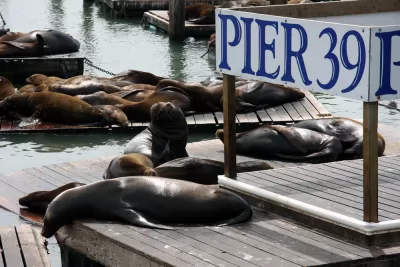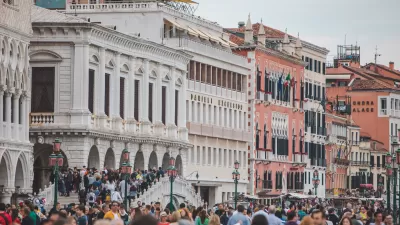Tourists' expectations when they travel are becoming increasingly sophisticated, seeking stimulating and meaningful experiences. The new book Gamification in Tourism shares how cities are designing memorable experiences.

A recent book, Paul Bulencea and Roman Egger's Gamification in Tourism: Designing Memorable Experiences takes on the popularity of gaming in tourism. Back in July, I shared with Planetizen ways that cities are being turned into a treasure hunt.
As I read this book, I was struck by the challenges that face city planners. We all work to create excellent cities, and many of our communities express a desire to promote tourism. But what is it that makes a community desirable to tourists and how is that changing?
Think back on a favorite vacation. What was it that was so memorable about that vacation? I recently took a vacation to Dubai. The most memorable experience was a falconry lesson. So why was this experience so memorable? Bulencea and Egger list key properties that are critical to a memorable experience:
- All senses are activated.
- The process is unique for the individual, having intrinsic valuable that is irreversible.
- Involves context with the real thing.

My falconry experience definitely followed these properties. I could smell the bird, hear it make noise, see it fly towards my arm. I worked directly with my guide, who gave me an individual experience teaching me how to get the eagle to land on my arm. It was certainly very real!
The experience economy is thriving. One key element of the experience economy is gaming experiences. Technology is being used to introduce gamification into the tourists experience in exploring the city they are visiting. A few examples from the book include:
- WhaiWhai: This unconventional tour guide is like the create your own adventure books from your childhood. The iOS app allows users to go on adventure with the city as the setting.
- Stray Boots: This mobile app transforms a walking tour into a scavenger hunt. It covers a wide variety of cities in the US such as Ashville, Cincinnati and Boise.
- Sighter: This is a photography based urban treasure hunt. The user sees a picture and then is given clues for how to find the location.
- Stockholm Sounds: This app, created by the Stockholm Visitors Board, that uses music and sounds as the key to introducing people to the city. All points of interest are connected to sound and music in Sweden.
- The National Mall: This iOS app is for use in the National Mall and contains a series of musical scores that are tied to locations throughout the park. It’s a choose your own adventure based on music.
- 5 Every Day: This app provides five things to do every day in Los Angeles, including art, city, food, music and a wildcard.
Cities have created little surprises that visitors can find during their visit. Warsaw, Poland has approximately 300 dwarf sculptures spread across the city. Each dwarf has a story. The result is that this is now rated as one of the top attractions on Tripadvisor. Visitors can visit a website that tells the story of every dwarf.

In Warsaw, Poland there are dwarf statues across the city with a special story behind each. This one called "Drinker and Boozer" The story reads "How surprising are the names these dwarves assumed. Probably in fear of the City Watch, to mislead them from what they are really doing in Św. Mikołaja Street. Paying no mind to bans and laws – they pour and swallow liquor out in the open!"
Gamification is entering all aspects of the travel experience. For example the airline KLM has introduced Meet and Seat. This allows passengers to select there seat based on who would be sitting next to them. Passengers can create a profile with their interests. This allows people to look forward to an interesting conversation on the plane ride.
Gamification in Tourism is worth the read and could give you creative ideas for how to create engaging experiences for visitors to your city. Do you have thoughts on how planners should be thinking about tourism? How should we be engaged in ensuring that we have successful experiences for our cities? Share your thoughts in the comments below.

Maui's Vacation Rental Debate Turns Ugly
Verbal attacks, misinformation campaigns and fistfights plague a high-stakes debate to convert thousands of vacation rentals into long-term housing.

Planetizen Federal Action Tracker
A weekly monitor of how Trump’s orders and actions are impacting planners and planning in America.

In Urban Planning, AI Prompting Could be the New Design Thinking
Creativity has long been key to great urban design. What if we see AI as our new creative partner?

Pedestrian Deaths Drop, Remain Twice as High as in 2009
Fatalities declined by 4 percent in 2024, but the U.S. is still nowhere close to ‘Vision Zero.’

King County Supportive Housing Program Offers Hope for Unhoused Residents
The county is taking a ‘Housing First’ approach that prioritizes getting people into housing, then offering wraparound supportive services.

Researchers Use AI to Get Clearer Picture of US Housing
Analysts are using artificial intelligence to supercharge their research by allowing them to comb through data faster. Though these AI tools can be error prone, they save time and housing researchers are optimistic about the future.
Urban Design for Planners 1: Software Tools
This six-course series explores essential urban design concepts using open source software and equips planners with the tools they need to participate fully in the urban design process.
Planning for Universal Design
Learn the tools for implementing Universal Design in planning regulations.
planning NEXT
Appalachian Highlands Housing Partners
Mpact (founded as Rail~Volution)
City of Camden Redevelopment Agency
City of Astoria
City of Portland
City of Laramie




























